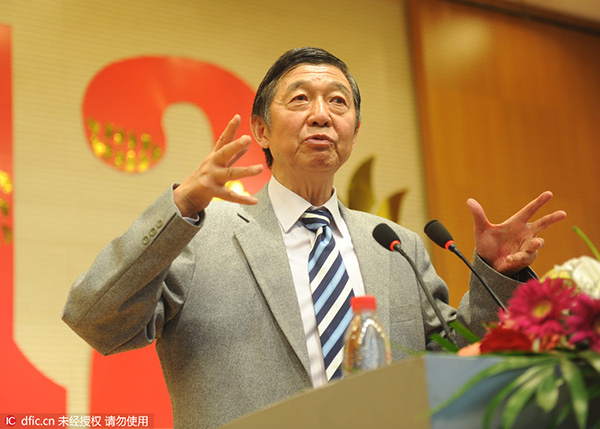Wu's death was untimely but his legacy will live on
Updated: 2016-06-21 08:02
By FU JING(China Daily)
|
|||||||||
 |
|
File photo of Wu Jianmin.[Photo/IC] |
On Saturday, I heard the sad news of the death of Wu Jianmin, a veteran Chinese diplomat who served long stints in Belgium, the Netherland, Switzerland and France.
At the age of 77, Wu, who used to be French-Chinese language interpreter for the late chairman Mao Zedong and premier Zhou Enlai, died in a car accident in Central China's Hubei province, where he was scheduled to deliver a speech.
In newspapers, on television as well as social media platforms, people from various walks of life have shown their deep sorrow and heart-felt respect to this mild, eloquent, visionary and peace-loving bridge-builder, who was a frequent speaker at various functions even after his retirement.
I knew him for years, apart from interviews, he frequently addressed various events organized by my newspaper.
On April 1, 2014, Wu spoke at an international seminar on China's reforms and the implications for the European Union, an event that was co-organized by China Daily in the College of Europe in the Belgium city of Bruges, where President Xi Jinping wrapped up his tour of Western Europe that day by giving a speech on Sino-EU relations.
Joining a host of prominent speakers, Wu urged peace-building at a time when there were geopolitical concerns in several regions.
Beyond his thoughts and visions, I was deeply impressed by his way of dealing with ordinary everyday matters.
He was 75 year-old and traveling alone. My friends arranged to pick him up and send him to the airport in Brussels. Shortly after he checked in and sat down to wait for his flight back to Beijing, Wu sent us a thank-you message. When he returned home, he emailed us immediately, thanking us again. In writing to me, he began with "nin hao", which is usually away for the young to address the old in Chinese culture.
After that, he sometimes, shared me some of his articles by mail.
Hearing of his death, I could not help but reread our email exchanges.
Now, as President Xi pays his second visit to Europe within three months, Wu would certainly have commented on the significance of the tour, which bonds China and Central and Eastern Europe closer.
But we will not hear his voice any more. Though his passing brings sadness, we can take comfort in the thought that at least he can rest peacefully for a number of reasons.
First, partly due to his efforts when he was working as China's ambassador to France, his spirited efforts led to a honeymoon period in the Sino-French relationship and that between China and EU.
At present, China and EU ties are not in ideal shape, but that is not to say that China's relations with some member states are not in a honeymoon period.
Second, Wu's legacy as president of China Foreign Affairs University from 2003 to 2008 is tremendous. In deep sorrow, many students and graduates have been showing their profound respect, vowing to follow the example Wu set and strive to work as professional diplomats.
Third, after his retirement, Wu also became keen on supporting dialogue platforms to boost understanding between China and the rest of the world. In doing so, teams of young people have learned about public diplomacy and how to convince others with sincerity and solution-based approaches.
Such training for "young ambassadors" will ensure they will carry on his mission to bridge the gap of understanding and make this world a peaceful place.
The author is deputy editor of China Daily European Edition. fujing@chinadaily.com.cn
Related Stories
Ambassador Wu will be always remembered 2016-06-20 08:16
Former ambassador Wu Jianmin, 77, dies in car accident 2016-06-20 08:14
Wu Jianmin remembered as a true globalist 2016-06-18 17:25
Prominent former diplomat Wu Jianmin dies in car accident 2016-06-18 11:51
Today's Top News
British parliament in rare recall for tribute to Jo Cox
2016 is likely to be the hottest year on record
UK opinion polls show shift towards 'In' for EU vote
Goals may need revision
Brexit strategy
UK Health Minister comes down on staying in the EU
China, Europe urged to set free trade timetable
Xi's visit to boost partnership projects
Hot Topics
Lunar probe , China growth forecasts, Emission rules get tougher, China seen through 'colored lens', International board,
Editor's Picks

|

|

|

|

|

|







